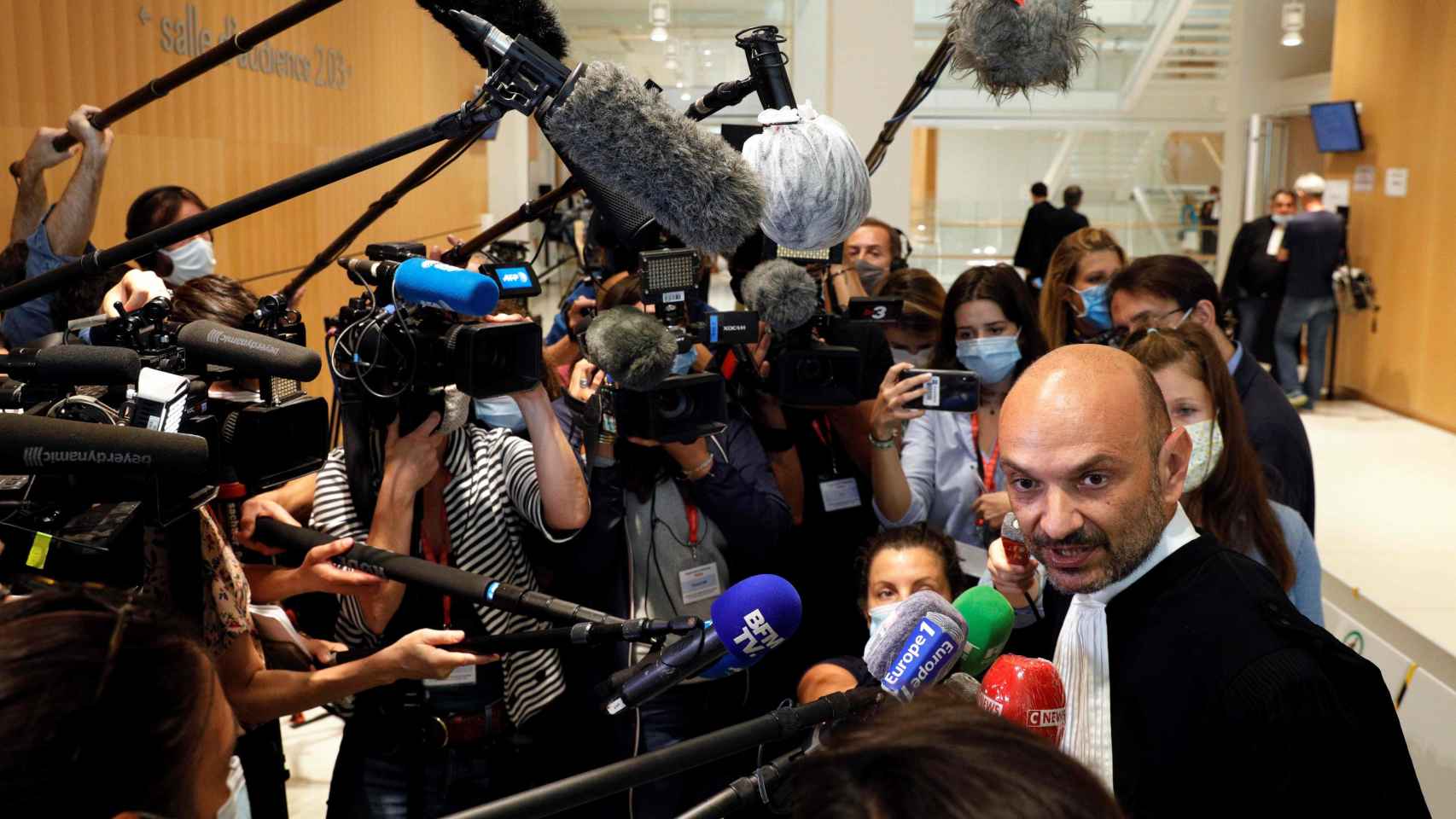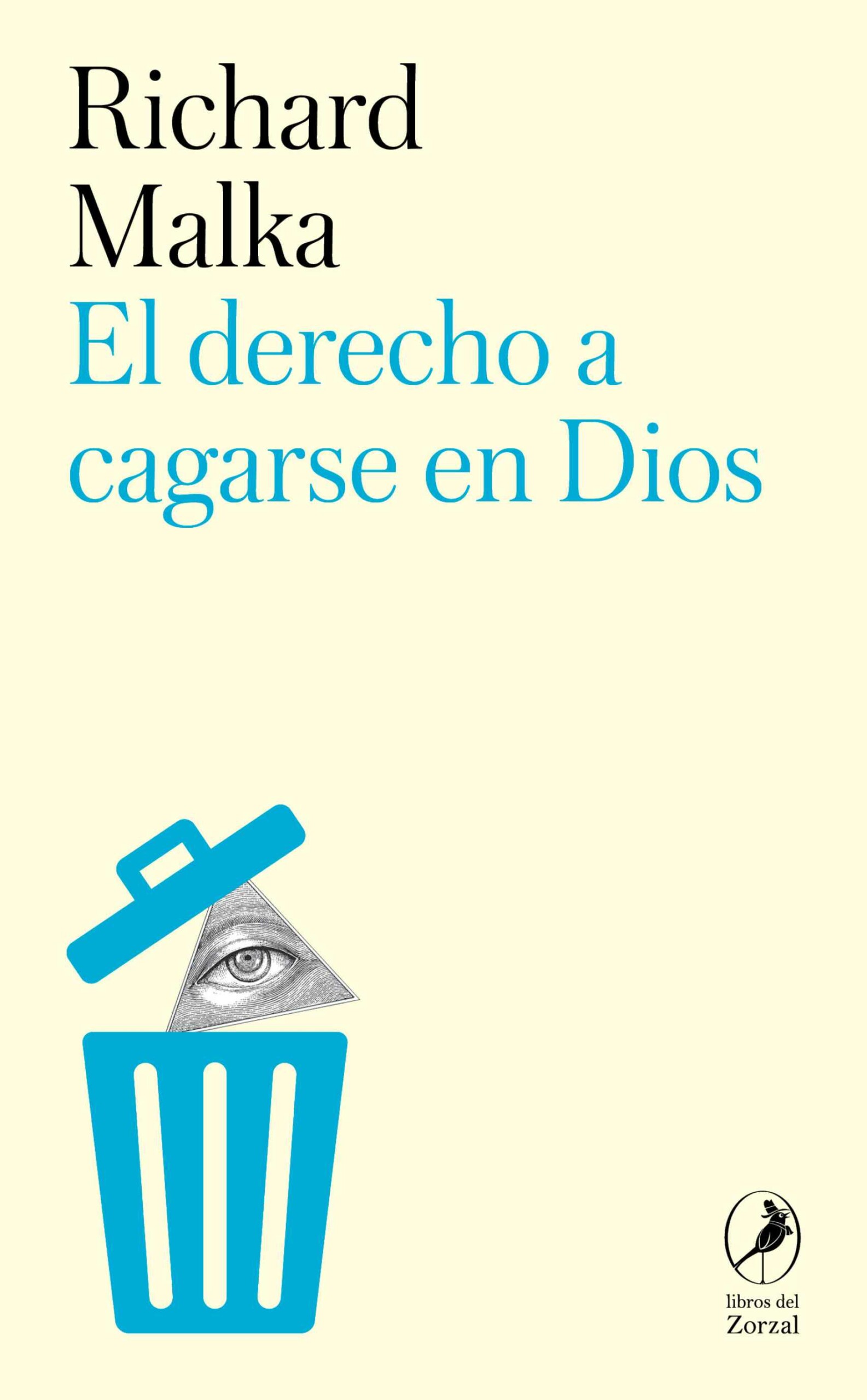And what if freedom of expression did not draw an ascending line in time, but rather a parenthesis? Specifically, one that opens in the 70s of the last century and closes today. That is what someone who has all the experience and legitimacy to talk about the subject raises: Richard Malka, the lawyer from the French satirical magazine charlie hebdowhose cartoonists and journalists became martyrs for freedom of expression when they were assassinated by Al Qaeda in 2015 for making jokes about Islam.
Malka, who has defended charlie hebdo in numerous lawsuits since it was founded in 1992 (30 years have passed and he was only 23 then) he was a few days ago at the Institut Français in Madrid to present his book in which he exposes his ideas about freedom of expression: The right to shit on Godpublished in Spanish by the Argentine publisher Libros del Zorzal.
The book is the transcript of his plea during the trial for the attacks on that fateful January 7, 2015.”Our thing is to laugh, draw, enjoy our freedoms, living with our heads held high in front of the fanatics who would like to impose their world of neuroses and frustrations on us, in co-production with university students full of Anglo-Saxon communitarianism and intellectuals, heirs of those who supported some of the worst dictators of the 20th century, from Stalin to Pol Pot”, writes the jurist. “Ours is to fight to remain free. We and those who will follow us. This is what is judged today. And to continue being free implies being able to continue speaking freely without being threatened with death, killed by Kalashnikov or beheaded”.
Needless to say, Malka lives threatened with death by radical Islam and with some safety precautions. A discreet escort accompanied him at the event and the journalists had to provide our identity document to access him. The lawyer downplays the conditions in which he is forced to live, saying that “defending threatened freedom always has a price, but they will never hear me complain in public thus”.
Malka opined at the Institut Français in Madrid that “free criticism of a religion was something that had already been achieved with respect to Christianity, Judaism and Buddhism”, and defends that in a democratic society the same treatment must be given to all religions, so it is not fair to try to ban criticism of Islam.
“The islamophobia is a word that was invented to prohibit criticism to that religion”, says Malka, who, taking the meaning of phobia which means “fear” and not “aversion”, adds: “We have the right to be afraid of Islamjust as we have the right to be against Christianity, which has caused hundreds of millions of deaths throughout history”. term that is used as a shield “to avoid seeing the fanatical phenomena and the political instrumentation of religion”.
It is not just Islamic fanaticism that is to blame: the other end of the clamp is “the famous Anglo-Saxon ideology according to which no one can be offended”. According to the lawyer and writer, if we comply with this requirement, this will force us “to live and associate only with people who have the same ideas as us”, and this will lead, as is already happening, to a social and political polarization getting bigger. “At universities there are many things that can no longer be expressed,” says Malka, who also mentions the recent burning of Tintin and Asterix books in Canada for containing stereotyped images of indigenous peoples.
Precisely the lawyer considers all France as “the Gallic village that defends freedom of expression” before the attacks of the Islamic fanaticism and also of the activism woke and identity. “Since the Revolution, France has been based on values such as universalism, which leads us to be guided by what we are similar to, and not by what differentiates us.”
‘Wokes’ and extreme right
Malka observes that “There is a disenchantment of freedom of expression that comes from the younger generations, who reject it as if it were a reactionary value that prevented some from advancing in their ideologies, which they consider progressive. But if freedom of expression continues to decline, you can be sure that all other freedoms will disappear.” According to the lawyer, freedom of expression is what protects us from the “monster of totalitarianism.”
The author also points out a curious change in trend: “In the past, the law repressed freedom of expression; now it defends it and it is the people who ask for restrictions of that freedom”.
“We always need new progressives. We live in a society that has not offered great ideologies since the fall of the Wall. There is no spirituality anymore, and capitalism no longer makes people dream like it did in the 90s. Neither does communism, nor religion , nor the idea of Europe. When we are young, we all need to believe in something greater than ourselves. Now there is a void and we have replaced social struggles with identity struggles”.
According to Malka, it is “a turnkey ideology that is intellectually very poor.” Young people, the author believes, “are promised that they will improve the world if they adhere to that ideology.”
On the other hand, it is curious that today it is the right, and especially the extreme right, that makes the banner of freedom of expression. “Has become a transgressive discourse that feeds the extreme right. Marine Le Pen only talks about it. It’s her new workhorse for a few months now, and especially in the last few weeks.”

Richard Malka speaks to the press during the trial for the 2015 attacks. Paris, September 9, 2020. Photo: Geoffroy Van Der Hasselt/AFP/dpa
30 years defending charlie hebdo
charlie hebdo was founded in 1992 and Richard Malka has been its lawyer ever since, no easy feat for a magazine that has been embroiled in countless lawsuits over its irreverent and often over-the-top satire. “At first, fundamentalist Catholic associations made many demands on us, closely related to the National Front of Jean-Marie Le Pen” (yes, the father of the far-right leader who now calls herself a champion of freedom of expression).
“We won all the lawsuits. That lasted a good decade, then it ended because they saw that they never won,” Malka continues. “They were replaced islamic associationsand we began to lose support because many people thought that we were facing weak groups, as if the religion of the weak did not do as much damage as the strong. As if the most fanatical side of that religion did not treat women terribly and did not say that homosexuals should be sentenced to death. Even in 30 countries around the world, being an atheist is a crime.”
Since the 2015 attack, charlie hebdo receives far fewer demands. “No one dares anymore, of course”says the lawyer. It would be like making firewood from a fallen tree. What greater punishment could be inflicted on these journalists and cartoonists than the brutal reprisal that was carried out against them?
In the fight for the defense of freedom of expression, Malka says that “we must maintain hope, because otherwise we become cynical and bitter.” “If you lose hope, you no longer fight, and you have to keep fighting, but I have to admit that we are not in a very positive moment right now for freedom of expression. Offense is no longer accepted, people get angry as if any offense were unbearable. This is related to the victimizing ideology. Now many people define themselves by their victim status and it becomes an addiction. All of us have been victims of something painful in their lives.”
What better example of this than his companions murdered on January 7, 2015 and those who survived, some of them with very serious physical and emotional consequences. “I have never heard them complain, never tell them when they come across them that they are victims. If one lives considering himself a victim, he will always be angry with life itself and with others.”
Benedict vs Francisco
In the collective imagination, the idea persists that Joseph Ratzinger, Pope Benedict XVI, was a reactionary intellectual, while Jorge Mario Bergoglio, the current Pope Francis, is a progressive. Instead, Malka praises the speech he gave. Ratzinger at the University of Regensburg in 2006, in which he spoke of the union of faith and reason, and the importance of the latter in the religious field. To explain one of the arguments of his speech, the pope cited a dialogue that the Byzantine emperor Manuel II Palaiologos had in 1391 with a Persian cultured on Christianity and Islam, and in which he alluded to the relationship between violence and islam. The quote was taken out of context and spread as if it were his own opinion, sparking some protests in the Muslim world and also some comments from Western political figures (such as Spanish President José Luis Rodríguez Zapatero) defending his freedom of expression.
“I’m not a Christian, but that speech was sublimeof great depth and intelligence,” says Malka. “For Benedict XVI there was no religion outside of reason, and it became a scandal.”
While Ratzinger defended in his speeches that religion should spread through the use of reason and not violence, the Pope Francisco committed his first media slip shortly after the massacre of charlie hebdofollowing which he said that freedom of expression must have “limits” and that “you cannot insult the faith of others”. In a colloquial environment, before journalists who accompanied him on his plane, he went so far as to say: “It is true that you cannot react violently, but if Gasbarri [uno de sus colaboradores]great friend, says a bad word about my mom, a punch can be expected. It’s normal!” As much as he added that “one cannot kill in the name of one’s religion or in the name of God”, his words were interpreted almost as a justification for the brutal Islamist slaughter.
Regarding that blunder by Francisco, Malka argues: “The Pope said that if someone messed with his mother, he would punch him. His mother exists, but no one has proven that God exists. It is absolute nonsense, he is not at the level of a pope to say those things,” he replies.
However, Malka believes that Pope Francis was not wrong when he said that freedom of expression should have limits, but that these should be “really necessary” and “as few as possible.” Among them, “do not insult people because of what they are.” In this sense, says the author of The right to shit on God: “I can’t say fucking Jew or fucking Arab or insult someone because of their sexuality or their race, but I have every right to criticize a person’s beliefs. There is a difference between a person and his beliefs, a person is not what he believes. Freedom to criticize ideologies and beliefs must be total.”
Follow the topics that interest you
Richard Malka, lawyer for ‘Charlie Hebdo’ threatened with death: “We have the right to fear Islam”

